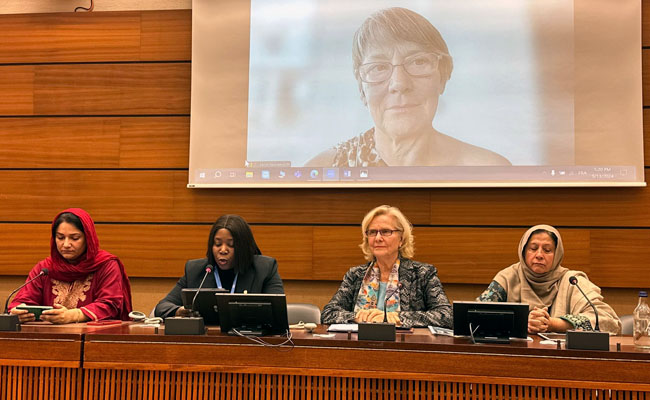Geneva: Speakers at a seminar hosted by International Muslim Women’s Union in collaboration with KIIR, AHRAAM and others
while highlighting the plight of Kashmiri women Speakers said that the effects of the long-drawn Kashmir conflict were felt hardest by the Kashmiri women who are more vulnerable to conflict than other segments of society.
The seminar titled “Women in Conflicts “was addressed by noted human rights activists, academicians and international law experts hailing from different parts of the world including, Mrs Shamim Shwal, Ms. Caroline Handschin Moussir, Barrister Margaret Owen, Ms. Wendi Momen, Ms Zarin Hansworth, Ms. Settla Harris, Ms. Hadia Sartaj , Ms. Naila Altaf Kanynie.
Urging global human rights organizations to take necessary action to halt the vicious cycle of violence and widespread mistreatment being carried out by Indian forces against the women of Kashmir in the occupied region.
The speakers emphasized the suffering of Kashmiri women, stating that as a vulnerable segment of society, they have borne the brunt of Indian state terrorism.
Referring to different heart wrenching mass-rape incidents that have taken place in the region, they said that the horrendous cases of sexual violence, like the one in Kunan-Poshpora, serve as grim reminder of the horrible situation the Kashmiri women have been facing day in and day out. Recalling the dreadful memories of the incident, the speakers said, “Around 300 personnel of the India’s 4th Rajputana Rifles entered into the villages in the guise of a cordon and search operation, dragged men out from their houses for interrogation and then proceeded to rape the woman who were left behind”. The speakers lamented that the Indian government and the authorities at the helm of affairs in the occupied Kashmir shamelessly tried to cover-up the incident and closed the case in October 1991.
“Women in Kashmir have suffered terribly at the hands of Indian occupation forces, and they were subjected to worst kind of physical and mental torture”
Citing media reports, they said, Indian occupation forces have been using physical and sexual violence as a weapon of war against women in Kashmir.
Despite more than 32 years passing, the rape-victims of Kunan-Poshpora village are still awaiting justice. “It is quite ironic that Indian state, which gives a notion of being a progressive society, is using rape as a weapon of war against Kashmiris to suppress the Kashmiris’ ongoing resistance for the realization of the right of self-determination”, the said adding that hundreds of cases of rape and harassment against women were reported in which Indian army personnel were found guilty but so far not a single army personnel has been held accountable for his heinous crimes.
They regrettably noted that the despite the passage of several years justice remain elusive for the rape victims as the police utterly failed to take action against the powerful army and reinvestigate the case following the SHRC’s recommendations.
The closure of the case, they said, was the result of the heightened pressure from the Indian army who approached the HC and got the orders of compensation and investigation stayed.
The speakers criticized the Indian judiciary and judges for failing to deliver justice to Kashmiri rape victims. Stating that delaying justice was tantamount to denying justice, they pointed out that the Indian judiciary’s approach to appease rulers has hindered its ability to hear cases on merit and provide speedy justice to victims.
They said that it was high time that the international community must pay heed to the situation in the region and hold the Indian government accountable for the crimes its forces were committing against the people of Kashmir.
Given the precarious situation in the region it has become even more important for human rights activists to keep a constant vigil over the situation in the restive region where people are being killed, maimed and murdered day in and day out by the Indian trigger-happy forces”, they added.
